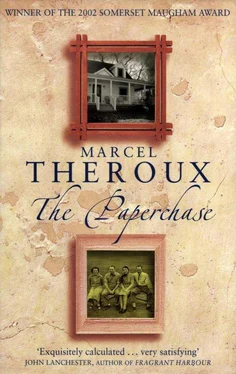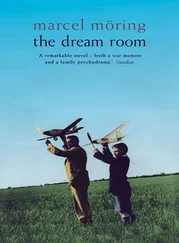‘Me neither,’ said Nathan.
It was almost five by the time the film ended, but it seemed later. Thunderclouds had taken over the sky, and the rain, which had been desultory as we sat with Terry under the skylight, crowded my windscreen faster than the wipers could clear it. The drops threatened to tear through the car’s ancient plastic roof.
‘Cool car,’ said Nathan.
We drove back under the raging canopies of trees. At the intersection with the road to Patrick’s house, a man was standing with his thumb out for a lift. He was wearing a black bin-liner as an improvised mac. For a moment my headlights illuminated his pale, unshaven face and the dark arch of his loosely open mouth. I saw him for less than a second, but it was enough for me to remember him later and recall myself thinking: He’s got a long wait.
NATHAN AND I RAN the few yards from my car to the Fernshaws’ porch but still got drilled with big cold bullets of rain. Mrs Fernshaw opened the door just as another clap of thunder struck. It was odd to see it register in her face. I wondered what it must feel like to her.
Mike Winks, Terry’s boyfriend, was ensconced in a chair at the dining table. He turned out to be a paunchy academic in a moth-eaten cardigan — or at least I remember him in a moth-eaten cardigan, but I can’t be sure I didn’t make it up afterwards because it was an article of clothing that would have suited him so well. He was a couple of years older than me. His pale, saggy face suggested a constitution that had consumed too much caffeine, smoked too many cigarettes and spent too many hours in a dusty carrel up in the book stacks.
The three of them had been chatting. Terry, whose white jeans had been magically renewed, sat beside him, resting her hand on his knee, and looking at him with evident adoration.
‘Aha, Nathan! Remember me?’ he said, getting up and holding out his hand. His voice was pleasantly hoarse. ‘Imagine: If a man who shakes hands up and down meets a man who shakes hands side to side, what will happen?’
Nathan looked perplexed but he extended his hand all the same. As they shook, their clasped hands went round and round in circles.
Mrs Fernshaw was baking macaroni. This time, when she invited me to stay to dinner I accepted immediately. I felt heavy-hearted at the thought of going back to my empty house. The Fernshaws’ tiny home seemed full of life and companionably cosy. Winks was brandishing a bottle of red wine and pouring it into tumblers. Even the light from the television in the other room seemed to crackle round the walls like flames from a hearth.
‘This is nice,’ I said. I didn’t speak much during the meal, which was conducted two-thirds in sign. Winks joked and teased. He was easygoing and likeable. Even when he was just talking to me he had the odd mannerism of signing his words as he spoke. He wasn’t dashing, but there was something reassuring about his presence. He had that odd American gift — or is it a kind of insensitivity? — of talking all the time and still seeming able to form a distinct and favourable impression of your personality.
Mrs Fernshaw — Winks called her Harriet — chased us out of the kitchen while she and Terry cleared up. The rain had stopped. Nathan was back in front of the television. I went out to the porch with Winks while he had a smoke. We kept the lights off to discourage the biting insects, and the darkness gave our conversation some of the intimacy of the confessional.
‘I met them doing research for my thesis about five years ago,’ he said. ‘It was me who encouraged Terry to go to Gallaudet. Now she’s planning to go to med school. They’re quite a find. We used to think the indigenous sign communities of the islands were extinct. We had an idea that some of the signs got adopted into ASL along with a lot of French. But what we’ve got here is a living link with the nineteenth-century deaf islanders, possibly even further back than that, maybe to seventeenth-century England. But that’s not a conjecture that a respectable academic would want to stake his tenure on.’
‘Is that your plan?’
‘I made it this year. I should say we made it. We’ve been together about a year. People had researched the deaf community on the island before but they kept missing the Fernshaws. I’ve got a hunch it was something to do with the old man. They don’t talk about him much, but I gather he was pretty much of an asshole.’
‘Where is he now?’
‘He died when Nathan was a baby. He was a fisherman. Hell of a tough guy by all accounts. Freak accident. Man works his whole life at sea and then drowns about twenty feet from shore. They don’t like to talk about it. It was a shame. That whole thing — sign, fishing — it’s all going. It’s all gone, practically. This place is turning into Long Island. Used to be it was far enough away to keep it special. But nothing’s far any more.’
‘No,’ I agreed, but I was thinking how far we seemed in that darkness from any life I knew properly. ‘How many people still use the language?’
‘This is it. A speech community of three. Maybe the world’s rarest living language. That’s what made the work so special.’
‘I know someone else who says his wife knows it.’
‘Who?’
‘Mr Diaz, he’s a lawyer in Westwich.’
The tip of his cigarette glowed brightly as he inhaled. ‘Well, I’ve checked out everyone who has ancestors on the island. Diaz is obviously not an island name. You know her maiden name?’
‘Nope.’
‘Thing is, she may know some signs, but that’s not the same thing as speaking the language. I can get us two beers in Tijuana, but that doesn’t mean I speak Spanish. People here like to say that everybody here spoke sign language. I don’t think it’s true. Everyone knew a couple of signs, knew enough to lip-speak so they could be understood. In LA, a lot of people can tell their maid to “ limpia el baña ”. It hardly counts as speaking the lingo, does it?’
‘My uncle had a couple of manuals of the language in his library,’ I said, to change the subject. With academics, you sometimes stumble on to some innocuous topic that turns out to be the pet rock they’ve been stroking for twenty years. Once Laura mentioned we’d just been to see Hamlet to an academic at a dinner party and we got three-quarters of an hour of ur-texts, Bad Quartos and printer’s errors.
‘Really? Why’d he have those?’
‘Local interest, I suppose.’ I realised that Winks assumed my uncle was English. ‘He was from Boston. He lived on the island.’ Mentioning Patrick made me remember the house, like a pile of a homework that I had left undone. The wicker rocker creaked as I stood up.
‘In the old Captain’s house?’
‘That’s right.’
‘Funky-looking old place.’
‘Well, you should drop round some time.’ I had begun to get ready to leave.
‘We’ll do that. Nice meeting you, Damien.’
‘Likewise.’
To their obvious pleasure, I thanked Terry and Mrs Fernshaw with a sign that Winks had shown me, then I went into the television room to say goodbye to Nathan.
‘See you, mate,’ I said.
‘See you. Thanks for taking me to the movie.’ He didn’t look round from the TV, but I felt so embarrassingly moved by his spontaneous gratitude that I didn’t know where to put myself for a second. I stood there long enough for him to turn to me with a puzzled expression, as if to say: Still here?
‘I’m off then,’ I said redundantly.
Winks stopped me by the kitchen table. He had his arm round Mrs Fernshaw. ‘Harriet says she remembers your uncle,’ he said. ‘It was your uncle, right?’
‘Patrick, yes.’
Читать дальше












